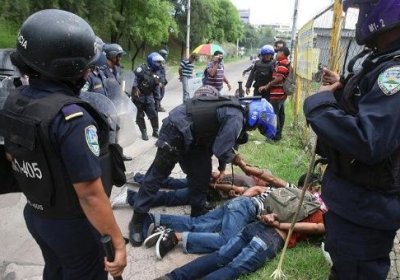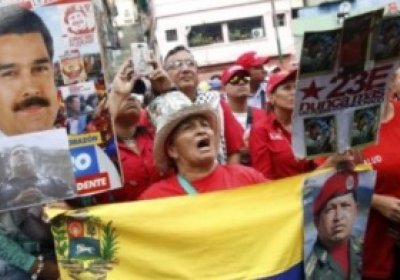More than two-thirds of Brazilians assess the coup government of acting president Michel Temer unfavourably and 32% think he is even worse than expected, a new poll by Vox Populi revealed on June 14.
Temer has been acting president since elected President Dilma Rousseff was suspended by Brazil’s Senate through an impeachment process viewed by many as a right-wing coup.
Temer was already a widely unpopular politician in Brazil. However, his first month as president and a series of unpopular measures, as well as a few scandals, have pushed his approval ratings even further south.
Coup d'état
 I just returned to the United States from Rio de Janeiro, where I was researching a story on the Olympics in August for The Nation.
People spoke to me about the displacement and police violence that are accompanying the games. Yet one of the hottest points of discussion emerged from outside the country: a call to move, or at least postpone, the Olympics to prevent the global expansion of the Zika virus, currently exploding in Rio.
I just returned to the United States from Rio de Janeiro, where I was researching a story on the Olympics in August for The Nation.
People spoke to me about the displacement and police violence that are accompanying the games. Yet one of the hottest points of discussion emerged from outside the country: a call to move, or at least postpone, the Olympics to prevent the global expansion of the Zika virus, currently exploding in Rio.
Venezuelan President Nicolas Maduro has hit out at “mounting aggressions” against his government after it was confirmed that a US plane had twice violated Venezuelan airspace.
The US Boeing 707 E-3 Sentry is reported to have illegally entered Venezuela’s national airspace on May 11 and 13.
Both incursions were detected by Venezuela’s Bolivarian air force and have sparked rumours that the US might be conducting covert spying operations over Venezuela.
“This plane has all the mechanisms to carry out electronic espionage,” said Maduro on his television program on May 17.
 Photo: Albaciudad.org.
The Venezuelan Supreme Court unanimously ruled on April 11 that a controversial “amnesty law” passed by the country's right-wing opposition-controlled parliament is unconstitutional, Venezuela Analysis said the next day.
Photo: Albaciudad.org.
The Venezuelan Supreme Court unanimously ruled on April 11 that a controversial “amnesty law” passed by the country's right-wing opposition-controlled parliament is unconstitutional, Venezuela Analysis said the next day.
Threats from a senior general that the army would take “direct action” against a possible Jeremy Corbyn-led Labour government show a jaw-dropping contempt for democracy.
Top brass “wouldn’t stand” for a prime minister committed to international peace, said the September 20 Sunday Times, and would be prepared to use “fair means or foul” to stop a PM who “jeopardise[s] the security of this country”.
The outspoken military chief remains anonymous, of course.
Allegations of human rights abuses have sky-rocketed in Honduras alongside a rise increase in militarisation in the violence-plagued Central American country.
 Tens of thousands of Hondurans took to the streets in torch-lit marches on June 26 for the fifth week straight of Friday night protests.
Marchers demanded the resignation of President Juan Orlando Hernandez and an independent investigation into the multi-million dollar corruption scandal embroiling the government.
Tens of thousands of Hondurans took to the streets in torch-lit marches on June 26 for the fifth week straight of Friday night protests.
Marchers demanded the resignation of President Juan Orlando Hernandez and an independent investigation into the multi-million dollar corruption scandal embroiling the government.
 President Rafael Correa speaks to thousands of supporters from the presidential palace in Quito's main square, June 15, 2015. Photo: EFE.
President Rafael Correa speaks to thousands of supporters from the presidential palace in Quito's main square, June 15, 2015. Photo: EFE.
There is a coup underway in Venezuela. The pieces are all falling into place like a bad CIA movie.
At every turn, a new traitor is revealed, a betrayal is born, full of promises to reveal the smoking gun that will justify the unjustifiable. Infiltrations are rampant, rumours spread like wildfire, and the panic mentality threatens to overcome logic.
Headlines scream danger, crisis and imminent demise, while the usual suspects declare covert war on a people whose only crime is being gatekeeper to the largest pot of black gold in the world.
Media attacks
It was obvious from the start that the aims of Thailand's military junta, which seized power last month, were not about a sincere attempt to restore peace between the two opposing sides in Thailand’s political crisis.
How could it be when the military were part of those who wanted to pull down the democratic system from the start?
The military staged an earlier coup in 2006, wrote a new, less democratic constitution, and appointed half the senate and most of the members of so-called independent bodies.
A national assembly of the National Front for Popular Resistance (FNRP), uniting more than 1500 delegates from across Honduras, voted on June 26 to launch a new political party, the Broad Front of Popular Resistance (FARP).
The FNRP is the main coordinating body of popular struggle since a right-wing coup overthrew the democratically elected government of president Manuel Zelaya two years ago, on June 28, 2009. One of its key demands is for a constituent assembly to draft a new democratic and pro-poor constitution.
Remembrance Day, on November 11, was celebrated again this year in the Australian media with pictures of red poppies and flag-draped coffins and historic photos of Australian soldiers who gave “the ultimate sacrifice” from the human-made wasteland of Flanders to the stony deserts of Afghanistan.
Paying tribute to the ten soldiers killed this year in the long war in Afghanistan, Governor-General Quentin Bryce said that Australians were good at remembering: “We seem to know what we ought to hold onto and what is best let go.”
- Previous page
- Page 3
- Next page






